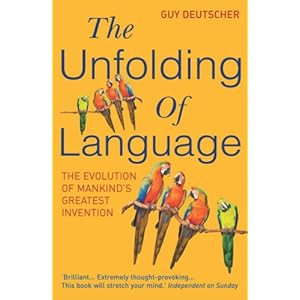This is the list of the best books I have read in the year 2010.
[ 1 ] Guns, Germs & Steel - Jared Diamond
This is simply the best book I have read so far. Winner of the Pulitzer Prize, this masterpiece endeavours to explain why the European societies were the ones to conquer the New World, instead of the other way around - an attempt by the author that was achieved using archaeology, geography; also, animal and plant biology!
[ 2 ] Fermat's Last Theorem - Simon Singh
Receiving almost 120 5-star rating in amazon.co.uk, this book explores the exciting journey of mathematicians through the ages to prove Fermat's last theorem (a deceivingly easy-to-prove mathematical equation). With riveting stories of the personalities behind this journey, this book is a testimony of my conviction that since there are so many non-fiction tales to read, I haven't the time to read fiction. Of course, history is not without errors, as long as it's written by fallible historians.
[ 3 ] The Unfolding of Language - Guy Deutscher
Aren't you interested to learn why our language is so different from others, and how come - apart from the differences - there exist similarities (even between English, French & Malay! - e.g. Two, Deux, Dua) ? Well, look no further, this book tells us just that, and much more - like why the language of our forefathers seem so different from ours.
[ 4 ] Outliers - Malcolm Gladwell
It seems so easy to attribute success to pure talent - as books written about high achievers often allude to. However, Gladwell tries to prove just the opposite, that if it wasn't for their luck, these high achievers (read: outliers) might not have succeeded in whatever field they're in. And this includes billionaires Bill Gates & Steve Jobs (Mark Zuckerberg was not included probably because this was written two years ago), the Beatles & athletes. Of course, in almost all cases, hard work had accompanied seizing every good opportunity.
[ 5 ] Life Ascending - Nick Lane
From the beginnings of life on Earth deep in the ocean, to the complex multicellular life on land able to trap energy from the sun (via photosynthesis), to sentient beings curious and intelligent enough to ponder on their own existence; this book brings elementary biology to a new level, attempting to explain the 'ten great inventions of evolution' using chemistry, biology, archaeology & common sense.
[ 6 ] The Ascent of Money - Niall Ferguson
British historian, turned Harvard professor, Niall Ferguson discusses the 'origin of money' - those colour-printed papers/copper we regard so dearly to. When many saw the recent financial crisis as the fall of capitalism - having researched and skilfully written the history of financial markets - the author had these words to conclude his book:
'..far from being 'a monster that must be put back in its place', as the German president recently complained, financial markets are like the mirror of mankind, revealing every hour of every working day the way we value ourselves and the resources of the world around us.
It is not the fault of the mirror if it reflects our blemishes as clearly as our beauty.'
-
[ 7 ] The Armchair Economist - Stephen Landsburg
An interesting read about the economics of daily life. From why popcorns are so expensive at cinemas, to why the government must not charge high tariffs on imported cars. It was so interesting that I finish reading it in barely two days!
[ 8 ] The Blank Slate - Steven Pinker
I have just finished reading this book over Christmas. A cognitive scientist goes head on with the nature vs nurture debate, from IQ to gender differences. Not for the faint-hearted, hardcore liberals or feminist/sexist. Otherwise, an insightful read! Nature -1; Nurture - 0
[ 9 ] The Denial of Death - Ernest Becker
This is the second Pulitzer prize winning book in my list. It is also the oldest one published among the others in my list. The late author explored, in this book, the philosophy of the denial of our inevitable demise: in our social life (loyalty to friendship circle), work (striving to build one's own legacy) and religion (the promise of an after life).
[ 10 ] Jews, God & History - Max I. Dimont
Finally, as the number 10 book of the year, this is, as its name implies, a record of the history of the Jewish people and how their beliefs (hence, 'God' in the title) had influenced their progress and fated them to meet challenges through the ages. I agree with the author after reading this book, that the Jews have been important contributors to our history (including the non-Jews), from the Judeo-Christian-Islamic scriptures & faiths, to our economic, philosophical, & scientific progress.
Although the author no longer professes the Jewish faith, he has great respect for it especially for his Jewish father. This book was not written to promote Zionism, argue for or against it. It does, however, discuss the history of the formation of Israel, wars & crises of the middle-east.











No comments:
Post a Comment